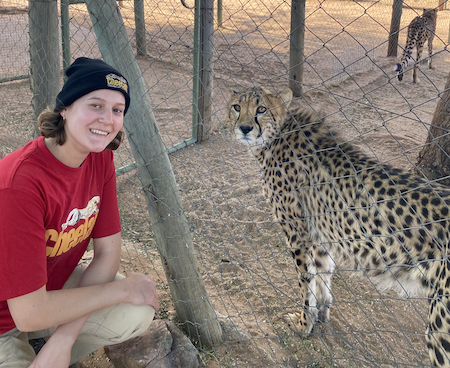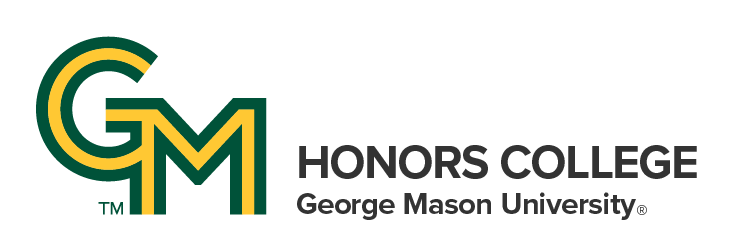Gwendolyne Fields will have many career options once she graduates from George Mason University.

Should she go for her master’s degree and PhD? Should she go to veterinary school and work with endangered species? Should she work with wildlife at a zoo?
“I don’t know, I’m still figuring it out,” said Fields, a senior biology major and member of Mason’s Honors College who is set to graduate this month. “But I do know I want to work with animals, and specifically conservation.”
Fields has a great head start, having just finished an internship at the Smithsonian National Zoo in Washington, D.C., where she did behavioral analysis of two Asian elephants. She has also lined up a summer internship at Walt Disney World’s Animal Kingdom as a conservation education presenter.
But closest to Fields’ heart was her internship during the summer of 2022 at the Cheetah Conservation Fund outside the town of Otjiwarongo in Namibia. That’s where she worked with the animal that has been her favorite since age 5, comparing the growth rates of Namibian and Somaliland cheetah cubs.
Fields recently presented her data from that internship at the National Conference for Undergraduate Research at the University of Wisconsin-Eau Claire. It was the cap to a Mason experience that not only fed her interests but gave her the hands-on experiences she needs to take her next steps.
Mason was there with funding for her internships through the Office of Student Scholarship, Creative Activities, and Research. Fields also attended the Endangered Species Conservation program at the Smithsonian-Mason School of Conservation in Front Royal, Virginia.
“I’m so grateful I came here,” Fields said of Mason. “I learned so much and made so many connections with people; great friends and memories.”
“She’s motivated, she’s self-reliant, she is naturally curious, and interested in exploring the world around her, in every sense of it,” said David Luther, assistant professor in Mason’s Biology Department and Fields’ mentor. “And she actually knows when to ask the right questions. That’s important for not stopping progress in whatever she is trying to achieve.”
Fields is from Arlington, Virginia, but with her dad constantly on the move at the State Department, the family also lived in Ethiopia, Argentina, Nepal, Luxembourg, and Germany. Fields speaks fluent French, is conversational in German, and can speak some Spanish.
Her love of cheetahs began when a wildlife veterinarian with whom her father worked in Ethiopia showed her some rescued animals. Fields called the Cheetah Conservation Fund herself to set up her internship. Though her research focused on monitoring and analyzing the growth rate of cubs up to 6 months old, Fields also worked with cheetahs throughout the facility, feeding them, cleaning their enclosures, and giving talks to tourists.
The baseline result that Namibian cheetah cubs had better growth rates than Somaliland cubs is important, Fields said, because “some cubs don’t have their mothers or the skills to survive in the world. So it’s important for zoos and other places that have cheetahs to really take care of them as best as possible. How much food should we give them at a certain age or weight? And if they are at a certain weight, we can estimate their age.”
Fields said she worked with about 30 cheetahs and learned they have personalities much like people.
“Some might seem a little grumpy,” she said. “Others are all lovey-dovey and want to come up to you to get your attention. Every day I was reminded how beautiful and majestic they are. I’d love to go back eventually and finish the research.”
Count it as another of her career options.
Read More Graduation Stories
- December 17, 2025
- December 15, 2025
- December 2, 2025
- May 2, 2025
- December 16, 2024
